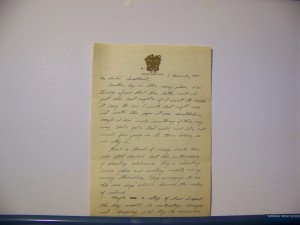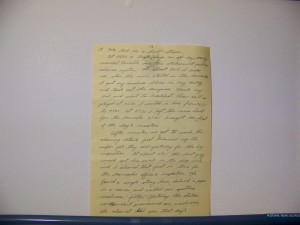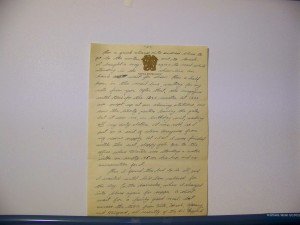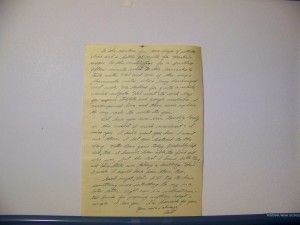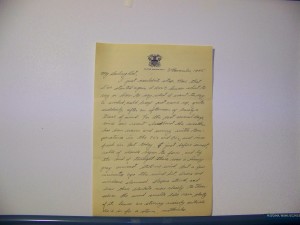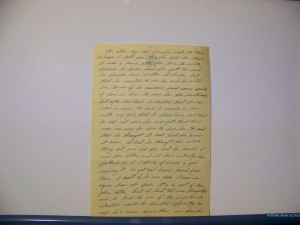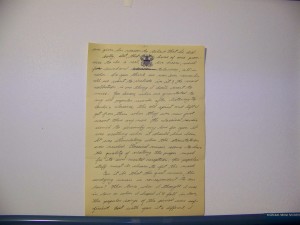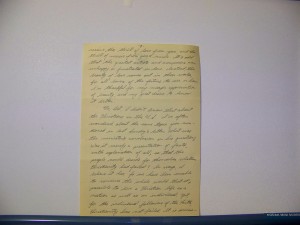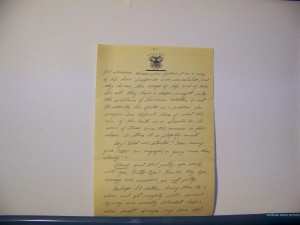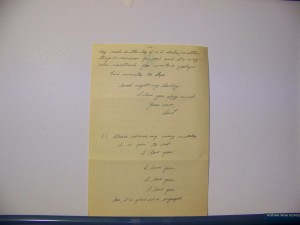In an attempt to pen a long letter, but with nothing pressing on his mind, Dart decides to tell Dot about his day, starting with 6:00 Reveille and ending with Taps.
It entailed a lot of changing clothes for the various tasks awaiting him; undress blues for breakfast, dungarees for cleaning detail, blues again for his long wait in the lunch line and the mail line, dungarees for doing laundry.
His cleaning detail involved trimming up the fine work that was done in preparation for yesterday’s inspection so they would do well on today’s inspection. The inspector “found a single stray hair behind a pipe and called our spotless washroom ‘filthy.’ (Yesterday the station commandant pronounced our washroom the cleanest he’d seen that day.)”
After reciting the mundane details of the day, he asks Dot if she’s ever been lonely in the midst of much merriment. He misses her terribly. “I don’t want you here. I want me there.”
With a promise to try to write something more interesting later, and an apology for not having the mental capacity to write anything more tender than “I love you,” he signs off on the first letter of the day.
Almost immediately, he resumes, dissatisfied with where he left things after his first five pages.
The warm and balmy day has turned gray and windy tonight. As he writes this, the wind is rattling windows and slamming doors. He predicts a storm is afoot.
He tells her that Hal finally wrote a long and gentle letter to Clare, the girl back home. He’s been putting this letter off for some time, knowing how she feels about him, but as much as he likes her, he does not love her, never has, and believes he never will. Dart says that Hal is saddened by the fact that he had to write the letter, but knows it’s the right thing to do. I can see why these two young men have become close friends — they are both honorable and sensitive to the feelings of others.
That dream home of theirs will be such a pleasure to furnish. He’s glad they agree on the record library. That leads him to a discussion of classical music versus popular music. When he was a kid, wanting to be in love, trying to be in love, even thinking he might be in love, the popular songs of the time were sufficient to express his feelings. Now that he is deeply in love, they seem trite. Only the classics resonate with him and seem to tell the real story of love. “It’s odd that the greatest artists and composers were unhappy or frustrated in love. Instead, the beauty of love comes out in their works, for all lovers of the future to see or hear.”
He follows that topic with a discussion about the sermon Dot mentioned in a recent letter, “Has Christianity Failed?” He wonders if the minister offered an answer, or presented facts so that the congregation could find their own answers. In his mind, he can answer it two ways: In a way, it has failed because Christians have been unable to convince the world that either individuals or nations can live a Christian life of peace and love. “Yet for the individual followers of the faith, Christianity has not failed. ”
What a trend he and Dot have started! He’s curious if any of the other girls in the house have become engaged or moved beyond the “going steady” stage.
It’s late and the storm is picking up speed. “Perhaps I’d better bring this to a close and get myself well-covered by my wee woolly blanket before this draft freezes my ears off.” He tells her how glad he is that they’re engaged.
